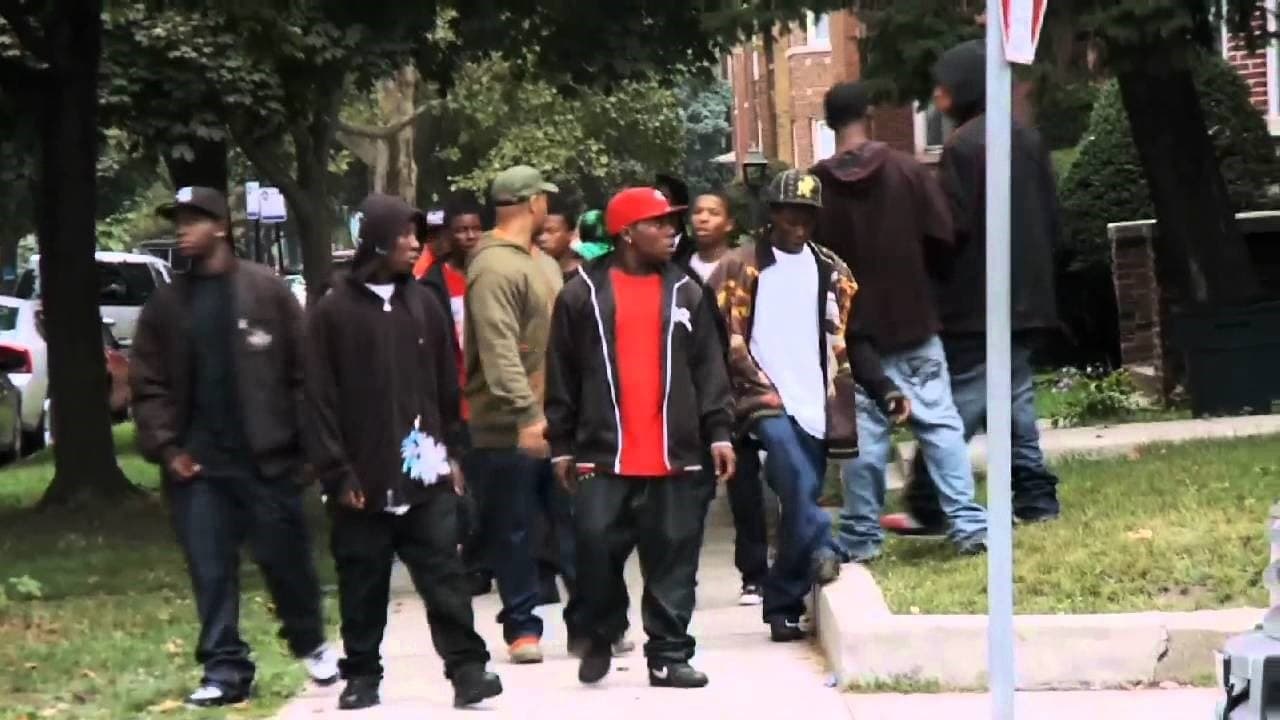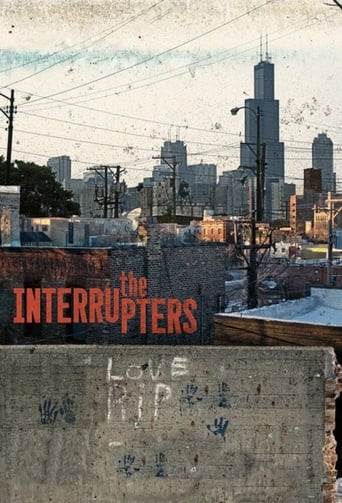

I really feel that movies like this are worth it - to see and educate oneself. One of the problems in America today are that the downtrodden and invisible people have no voice or medium through which to tell their stories. Movies like this show us ... how powerful these stories truly are.The Interrupters themselves were my favorite characters. I wish I could see more and more movies on people who have truly transformed their lives from hopeless to meaningful. There are many out there - fighting the good fight, against all odds. And the best outcome of a movie like this - is to feel transformed yourself, inadvertently, because you've become inspired to take back your power and use it to be the best person you can be, in whatever your situation is.
... View MoreThis film is recommended.Flowers and candles, hand-printed messages written on notebook paper tacked to makeshift shrines, all decorated with photographs of young victims. This touching memorials litter the blood-spattered streets of Chicago and are the remains of the day in The Interrupters, a powerful and disturbing documentary by the talented Steve James ( Hoop Dreams ).His film takes the moviegoer directly into the crime-ridden neighborhoods as we meet a group of peacemakers trying to restore sanity and preaching their anti-violence message to the choir. The group is called CeaseFire and it is made up of ex-gang leaders and former convicts whose motto is Stop the Violence - Save a Life.James directed and photographed his documentary and focuses on three interrupter and their "scared straight" strategies of tough love and reality checks. We met Cobe Williams, a former gang member and family man now whose father was killed during a street fight, Eddie Bocanegra, a young man easily impressed by the gang's image of fast cars, money, and girls who served 14 years for murder and now uses art as a method of expression and conflict mediation, and the primary spokesperson, Ameena Matthews, the daughter of a gang leader who was physically, emotionally, and sexually abused at an early age and has since let faith and family lead her away from that life-style and keep her grounded.We also met some of those troubled teens: Caprysha, a defeated Precious type, living in a halfway house, dreaming of a better life while constantly lying and breaking her parole; Lil Mikey, released from prison and wanting to be a better role model for his siblings; and Flamo, a young man enraged with his mother and brother's arrest and wanting his own form of justice. It is impossible not to care about their people and their lives.The film consists of interviews with gang members, families of their victims, and scenes of escalating violence. At times, The Interrupters becomes slightly repetitive in its interventions and lock-step mindset of anger and frustration. More judicious editing could have made the film even more forceful. But the passion for its compelling subject and James' craft as a filmmaker make up for those minor complaints.The documentary gives us no easy answers as drugs, unemployment, alcohol, poverty,and guns still are a major reason for the neighborhood's ills. Politicians come and go with each election, giving lip service and promises. Yet these people and their difficult lives become the on-going problem in search of a solution, and groups like CeaseFire seem to be their only course of positive action. The Interrupters allows us to see a world that we can never fathom and acknowledge the spirit of a group of strong-willed survivors, trying to make a difference and save a life or two throughout a normal day. GRADE: BNOTE: Visit my movie blog for more reviews: www.dearmoviegoer.com
... View MoreChicago, Baltimore, Oakland, Detroit – synonyms for American crime, places where young men kill one another in the streets. Bleak background noise in the national news, with dim flares of outrage at especially gruesome killings.On the subject of solutions, our imaginations are dismally poor and usually limited to applying money or violence in some form. More police, more arrests, longer sentences, talk of the National Guard on the streets.The Interrupters seem to have a better gimmick. The violence prevention group CeaseFire recruited a group of tattooed ex-gang-members in Chicago, most of whom turned away from crime after cooling off in hospitals or prisons. They know the locals, and they have credibility where cops, teachers and politicians don't.The film follows several of them: a tough gang heiress turned devout Muslim, an imposing man with several prison terms for drugs and violence, and a soft-spoken Latino out after serving 14 years for murder. Interrupters are, in effect, roaming street counselors; unlike the armchair type, they usually find themselves between two or more people who are about to begin stabbing one another. They are to ordinary counselors what BASE jumpers are to people who feel proud of taking stairs.The rare and valuable insight of the film is how, over the course of a year, the counselors manage to talk down people who're about to do horrible things, and how these people arrive at such a place to begin with. None of them are remorseless sociopaths, and none of them appear to want or relish violence. They want the best for themselves, they value their families, and yet some have come to the verge of actual fratricide. Why? Hopelessness, poor impulse control, lack of role models, a gang tribalism that feeds on vacuum and anarchy.It's amazing how many fights and murders aren't motivated by gain. They're essentially the result of undereducated boys applying the Cheney Doctrine every day on street level – "get them before they get you." On these streets, nobody trusts each other, everybody is armed and nobody is willing to back down from a fight. Tempers can flare instantly, and the killers are often as baffled by their own crimes as anybody else.Somehow, the Interrupters pull young people out of this mindset. It takes a heroic amount of trust and patience. It doesn't work all the time. But it works way more often than one imagines it should.There is a large and influential contingent in our country which holds that the only solution to inner-city violence is to tighten the screws even further. To their Klingon eyes, the CeaseFire approach probably looks like so much liberal mollycoddling of people who just ought to have their heads busted on the pavement more often. One of the thicker ironies of "The Interrupters" is that this Old Testament law enforcement mentality comes from precisely the same place as the bloody retaliations and preemptive violence by South Side gang-bangers.I listened to the young ruffians, and heard the words of steely-eyed Giulianis: not backing down, not showing weakness, getting tough, getting serious, showing them who's boss. Once you realize that "tough on crime" politicians count on the same tactics to intimidate gangs that gangs use to intimidate one another, you may recognize the same lustful rage in yourself as well, and subside to embarrassed head-scratching.The Interrupters talk about the legal trickery of being involved in potential crimes, and sometimes the organization has no choice but to get law enforcement on the case. However, their strength is not in meting out punishment, but understanding – and it's astonishing to see violent young toughs respond and open up. Even with all the money, cops and technology that America can scratch together, maybe the best way to solve social problems is still through one person talking to another.
... View MoreThis film takes a year-long look at the work of a group of volunteers trying to reduce murders and violence in inner-city areas of Chicago. They do this by intervening wherever possible, trying to mediate on the streets between those reading to kill over as little as $5 or a perceived slight, cool the anger before it spills over into bloodshed. The majority of the volunteers have a background in the gangs themselves, have served jail time but were able to get out while they still have their lives. The film follows three of the volunteers during a year where the profile of the Chicago murder rate is raised to the national level.From the director of Hoop Dreams, this film gets right down onto the streets of Chicago and, while the volunteers are dealing with people ready to kill, the camera is right there too – getting good access and surprisingly natural footage from everyone involved. For the most part it is the capturing of this world that makes the film engaging because while many people (particularly on the internet!) would like to pretend they live in tough situations and are ready to turn to violence over nothing, the majority in the western world are not and certainly for me, I appreciated an insight into the world of those who are ready to pick up a knife and stab someone because of a slight on their family. The camera captures a real natural air when situations are at their most flammable and also in the one-on-one chats, but it doesn't quite manage it when there is a group. Sometimes when break-throughs are being made with groups, it does feel a little uncomfortable and I got the sense that the camera was becoming a little bit of an intrusion.Likewise, although it isn't overdone, the film also uses sentimental music a bit too often over the top of insights or breakthroughs – and it did annoy me a little bit because none of it actually needed this music. None of these things are bad though, just a little negative in terms of impact. This is covered by how good the chosen subjects are – in particular Ameena and Cobe. To my external ears they occasionally sound uncomfortable or odd or even a bit too much like they are saying platitudes and hyperbole, but yet they work and generally their words and attitudes make an impact – even if they don't always make a lasting impact on a person's life (although the goal is always to get through the immediate threat of violence). James makes good use of them and in Ameena he finds someone likable, charming, intelligent and empathetic – she doesn't just "say" what she is doing and feeling, she lives it and it comes out in every word; wisely she is the heart of the film.Overall The Interrupters is not a perfect film because it does occasionally overdo the sentimentality and gives the subject a sense of worthiness that they may deserve but that the film doesn't benefit from. It also doesn't have much of a sharp investigatory edge, a little of which it could have done with a little bit of, but otherwise the film is engaging and moving thanks to the ground-level access and the force of the personality and bravery of the volunteers focused on.
... View More